Although cricket was undoubtedly played in Malta as early as 1800 by the British garrison, it was not until 1887 that the first match was recorded when the game in which the Band Boys’ Black Watch beat the Duke of Cornwall’s Light Infantry by 24 runs was reported in the Malta Daily Chronicle.
Many of the early matches were played on the Floriana Parade Ground, adjacent to the walled city of Valletta. The ground is no longer in use since it was converted into Independence Arena in 1964. One of the sight screens still survives, however, an enormous block of sandstone, 9.1m long and 3m high, one of the most remarkable and permanent screens in the world. In the 1880s the area was open to the public with the result that cricket attracted a local following and stimulated the local Maltese to form the Colonials Club in 1903. This later became Floriana CC. Other Maltese clubs in the early 1900s included Dockyard Albion, Sliema and Kalkara. Cricket was also taught at St Edward’s School.
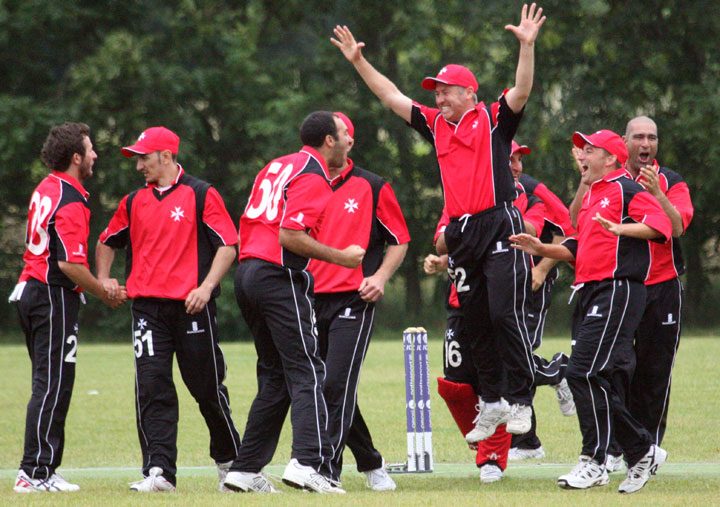
In 1891, Malta played its first international when a combined Fleet and Garrison XVIII met twelve players from Lord Sheffield’s side on their way to Australia. The English team, which included WG Grace, made 200 for the loss of nine wickets, six of which were taken by Moon. The Maltese replied with 88 for 13. The match was played at the United Services Ground, Marsa, which to this day is the major ground in Malta. The garrison entertained the amateurs of the English party in the evening. It is not known how the professionals in the touring party, left to their own devices, amused themselves.
Up until the 1950s cricket was an important recreational pastime. Representative elevens met teams from the Services as well as crews of ships visiting the harbor. In the 1950s however, economic difficulties caused many Maltese to emigrate and others to work longer hours in order to make a living. As a result, Maltese involvement in cricket ceased. The Floriana Club celebrated its 50th anniversary in 1953 but disbanded in 1962. Cricket became an elite game played largely by the military.
In the 1980s some expatriates of Asian origin restarted civilian cricket. Occasional matches were played against visiting club sides from England, including the Free Foresters, Incognti, the Cricketers Club of London, a team raised by Bertie Joel, and a British Women’s which more than held its own against the men’s XI’s. Nevertheless the departure of the British services in 1979 again severely threatened the existence of the sport.
It was saved by the return of Maltese emigrants in the late 1980s. The Malta Cricket Association was formed in 1989 and the following year a side was sent to Guernsey, where they finished eighth out of eleven sides in the European Cricketers Cup.
They recorded their highest score of 367 for 3 in which Frank Spiteri scored an unbeaten 157 against Greece in 1997. They were awarded Affiliate status in 1998 and their first foray into the ECC Trophy came in 1999 when they travelled to Corfu with the following squad: T Azzopardi, C Borg, J Callus, J Farrugia, J Grima, M Micallef, A Naudi, C Naudi, D Willis, S Ali, J Rosser, J Shah, S Dhandadani.
They finished sixth out of seven teams, losing to Portugal, Sweden, and Austria, with Rosser’s seven wickets the highlight of their performances.
They were back in 2001 when they improved to reach the semi-finals. In the group stages they beat Spain, Finland and Sweden, but lost to Portugal. In the last four they lost to Austria. Best displays in the tournament came from Frank Spiteri who made 68 and 69 in the wins over Sweden and Spain, while Angelo Spiteri and Mike Caruana also hit 50s.
They were back in Austria for the 2003 ECC Trophy where they recorded three wins to finish third in the 11-team event. Their squad was as follows: Angelo Spiteri, Michael Micallef, Radakrishna Dhandapani, Swamy Dhandapani, Frankie Spiteri, Chris Naudi, Andrew Naudi, John Farrugia, Michael Caruana, James Towers, John Grima, Tony Azzopardi, John Callus.
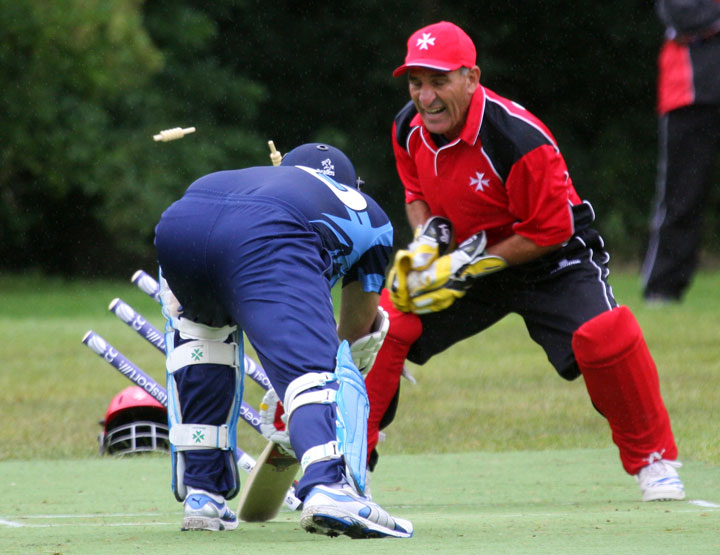 A stumping by John Grima
A stumping by John Grima
Frank Spiteri’s 97 not out helped them beat Finland by eight wickets, while he and Mike Caruana made fifties as they overcame Portugal by four runs in a thriller. In the Championship group, Caruana and Andrew Naudi scored 50s as they beat Greece but they lost heavily to Norway and Austria.
They went to Belgium in 2005 for the Affiliates tournament where they finished sixth out of nine teams. In the group stages they lost to Belgium despite 61 from Mike Caruana, but made the Super Six Phase thanks to a brilliant 95 from John Callus and 66 from Andrew Naudi, having looked well beaten by Finland with Andrew Armitage taking five wickets.They lost all four games in the Sixes, but Michael Caruana took 5 for 11 against Hellas, with John Callus made back-to-back 50s.
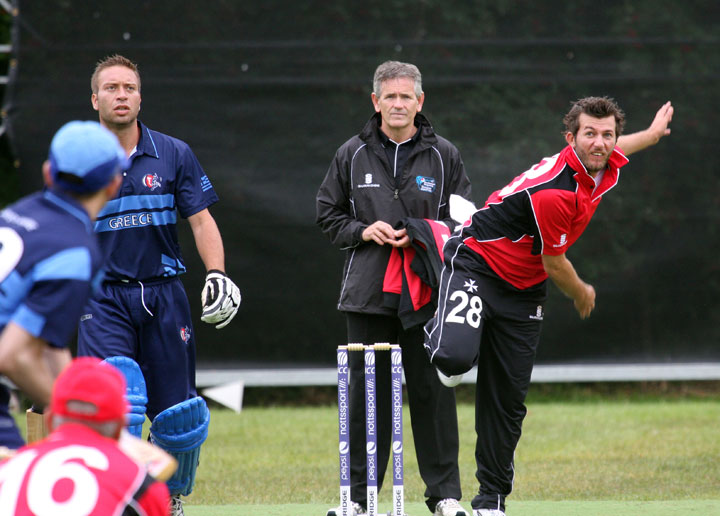 Andrew Naudi
Andrew Naudi
They travelled back to Belgium for the 2007 European Division Three tournament where they finished fourth out of eight teams. Ronnie Sacco’s four wickets coupled with 41 from John Callus helped them beat Cyprus, but despite four wickets from Sacco again, they were well beaten by Isle of Man, while their final group game against the hosts was rained off. They lost by 9 wickets to Croatia in the semi-finals, while they also lost to IOM despite a half century from Spiteri.
In 2009 they began to show the effects of an ageing squad as they finished bottom of their group, suffering some chastening losses along the way. The only win came against Portugal thanks to four wickets from Angelo Spiteri and a half century from John Callus.
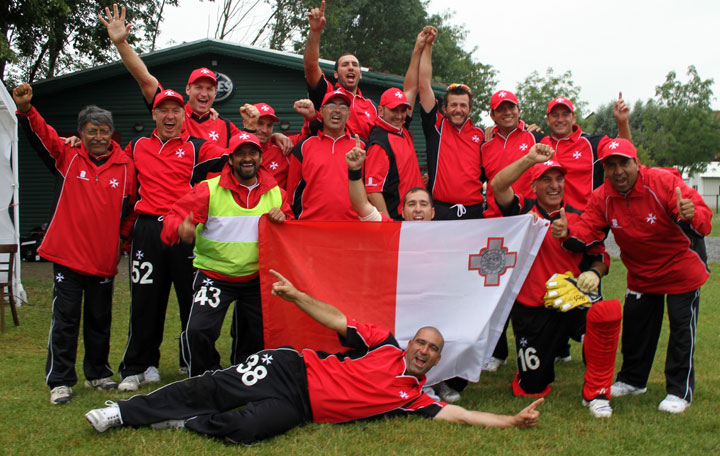 Malta squad at the 2011 European Division 2 tournament in Belgium
Malta squad at the 2011 European Division 2 tournament in Belgium
2011 saw T20 become the staple diet and they struggled in the format in the Division Two tournament in Belgium. They lost all five group games heavily, but recovered a little in the placing to finish 9th. Andrew Naudi scored 62 and took three wickets, while Mike Caruana claimed four scalps in the win against Cyprus, while Naudi’s four wickets saw them edge out Sweden by three runs.
Their final official European tournament came in 2012 when their decline saw them finish in last place, 12th in Corfu. Their only win came against Luxembourg, thanks to a half century by Andrew Naudi.
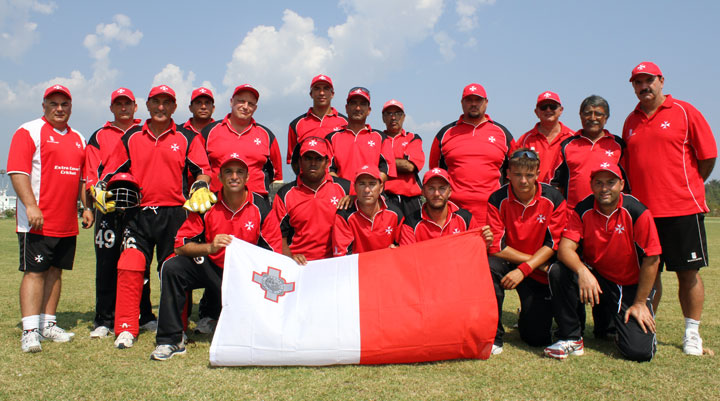 Malta squad at the 2012 European Division 2 tournament in Corfu
Malta squad at the 2012 European Division 2 tournament in Corfu
Thereafter while not playing in European tournaments they continued to play a series of bilateral matches. In 2016 during a series against Luxembourg, Frank Spiteri passed the landmark of 1500 runs for his country, while in the same series Andrew Naudi made his 54th and 55th appearances, overtaking Mike Caruana (53) as the most capped player.
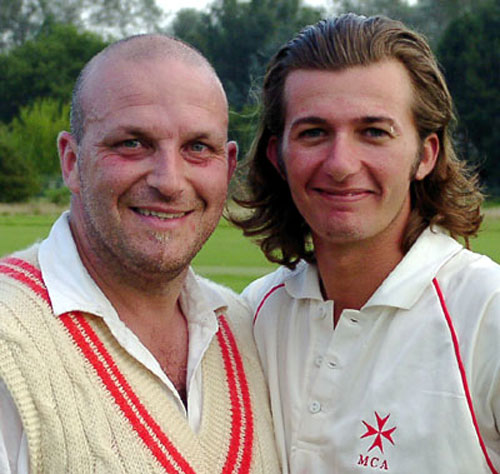 John Callus and Andrew Naudi
John Callus and Andrew Naudi
They were granted Associate status in 2017 and played their first official T20I’s in 2019, losing twice to Spain and the Czech Republic. They hosted Bulgaria in September 2020, winning two matches, while the third was rained off. They were ranked at 68th in the last ICC rankings.
This article was written by Roy Morgan in 2006 and has been updated by CricketEurope.

